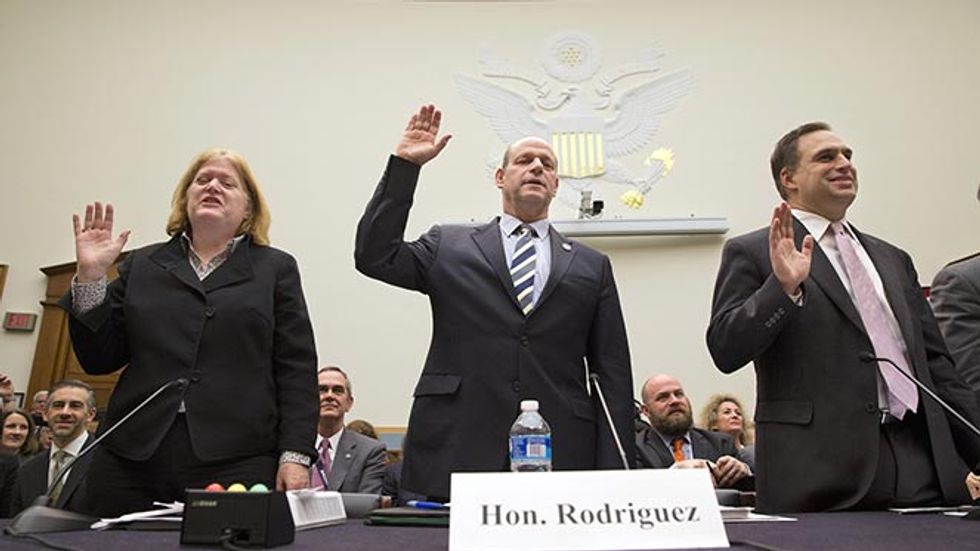
© 2024 Blaze Media LLC. All rights reserved.
States have a right to fight transformation through refugee resettlement
December 02, 2015
Last week, Texas health commissioner Chris Taylor sent a letter to a refugee resettlement organization threatening a lawsuit if they fail to cooperate with state officials and continue unilaterally with resettlement activities. Many in the media are scoffing at the state’s efforts to fight the Islamic resettlement, claiming that states have no power to influence federal immigration policy.
That assertion is simply not true.
Nobody disputes the fact that Article 1 Section 8 grants Congress plenary power over immigration and naturalization. Ultimately, if the federal government wants to screw the states and transform their societies for the worse, there is not much legal recourse for those states. However, it is important to remember that states were given a role in refugee resettlement policy as well, and that role is defined by congressional statues, not administrative policy. And to the extent governors can leverage their role as defined by statute, they should not let the administration, much less private contractors, intimidate them into endangering the citizens of their sovereign states.
The Purpose of Federal Power Over Immigration
To begin with, the application of federalism vis-à-vis immigration policy has been turned on its head—upside down, inside out—over the past few decades. States like Arizona that wish to protect their sovereignty from illegal invasion and either echo or compliment federal congressional laws are being thwarted by an imperial executive branch that violates congress’ plenary power, ironically, in order to assert federal preemption over states. Yet, at the same time, hundreds of state and local governments blatantly violate congressional statutes and refuse to corporate with federal authorities on removal of criminal aliens, but this administration does nothing to clamp down on them.
Although state refusal to admit refugees—unlike state immigration enforcement laws, such as Arizona’s SB 1070—can potentially run amok Congressional plenary power over immigration, it’s important to first study why the Framers of the Constitution federalized immigration policy after states had full control under the Articles of Confederation.
Aside from the desire to create uniformity, the Framers wanted federal control over immigration vested in the federal government in order to prevent individual states from flooding the country with undesirable immigration through lax laws, not for the purpose of transforming states by coercing them to take in illaudable immigrants. Our Founders never envisioned such a suicidal federal government that would fundamentally transform its own society through self-immolating immigration policies.
Justice Joseph Story echoed these sentiments in 1833 in his Commentaries on the Constitution. “If aliens might be admitted indiscriminately to enjoy all the rights of citizens at the will of a single state, the Union might itself be endangered by an influx of foreigners, hostile to its institutions, ignorant of its powers, and incapable of a due estimate of its privileges,” wrote Story.
Hence, the purpose of federal control was to prevent states like modern California from transforming the entire country through its ill-advised policies, not to prevent states like Arizona from clamping down on those here in violation of federal law or a state like Texas from protesting Sharia-adherent immigrants within its borders.
Roger Sherman, among the greatest of all the Founders, noted during the House debate on the Naturalization Act of 1790 that “it was intended by the Convention, who framed the Constitution, that Congress should have the power of naturalization, in order to prevent particular States receiving citizens, and forcing them upon others who would not have received them in any other manner.” Sherman was emphatic that federal control was designed to “guard against an improper mode of naturalization,” and prevent individual states from flooding the country with immigrants based on “easier terms.”
Indeed, the federal government never exercised its control over immigration until the late 1800s (first in 1875 and 1882). Prior to March 1891, when the federal government centralized immigration enforcement, states were responsible for most enforcement against immigrants deemed a danger or public charge on their states. Clearly, states always had the prerogative to protect their residents and the reason immigration policy was federalized was out of concern that states weren’t or couldn’t do enough to properly protect the sovereignty of the people.
What Refugee Law Really States
You might be thinking, it’s true that the existing federal policies on refugees clearly violates the spirit of federalism on immigration policy and the framers would have never granted the federal government control over immigration to harm the states, but at the end of the day it is the law.
Not so fast.
If you read Sec. 412. of the Immigration and Naturalization Act [8 U.S.C. 1522], the state is supposed to have input at every stage in the process. The word “state” is mentioned 41 times in this section. The 1980 Refugee Act was clearly written to prevent some of what we are seeing today. What we are seeing today is the ultimate societal transformation without representation, as the federal government is using private contractors to colonize and transform local communities without taking into account the impact on the locality, as prescribed by the statute.
First, the statute dictates that “local voluntary agency activities should be conducted in close cooperation and advance consultation with State and local governments.” This means that no resettlement of a single refugee—be they from Syria, Somalia, Bhutan, Burma, or Canada—can be resettled in the state and county without advanced consultation with state and local officials at every step of the process.
This has clearly not been practiced in most states over the past decade, as a number of localities have been colonized without the consent of the people and local officials. The Obama administration is even touting a “new program” in which the State Department will compile data on the number and nature of refugees settled in a state upon request from the governor. This is a clear admission that, until now, the administration has been hiding data even after the fact, much less consulting with states in advance of the resettlement.
Thus, it is the administration, not the states, that has been in violation of refugee resettlement law passed by Congress, much like the dynamic with enforcement of laws against illegal immigration.
Moreover, the entire premise of colonizing small areas like Lewiston-Auburn, Maine with 7,000 Somalis and Minneapolis with 30,000 is in clear violation on the directive that the federal government take into account the impact on local communities.
The statute clearly directs the Office of Refugee Resettlement (ORR) to “insure that a refugee is not initially placed or resettled in an area highly impacted by the presence of refugees or comparable populations.” When making this determination the Director of ORR is supposed to take into account “the proportion of refugees and comparable entrants in the population in the area,” “the availability of employment opportunities, affordable housing, and public and private resources,” and “the likelihood of refugees placed in the area becoming self-sufficient and free from long-term dependence on public assistance.”
With the crushing costs of welfare, housing, education, and most importantly, social transformation, the Obama administration has completely ignored the letter and spirit of the law. And one thing nobody even thought to write in the statute was to factor in turning the locality into a terror recruiting hub like what we’ve seen in Minneapolis.
Finally, the refugee resettlement statute directs the ORR to factor in “the secondary migration of refugees to and from the area that is likely to occur.” In other words, turning Minneapolis into Little Mogadishu is against the law. What we’ve seen over the past few decades is that once an area is colonized for refugee resettlement it forever becomes a magnet for secondary migration through chain migration policies. And remember, some of the recent refugees, such as those from Somalia, have the highest birthrates of anyone in America.
Conclusion
At the heart of our social compact expressed in the preamble of the Declaration of Independence is governance by the consent of the governed. The notion that communities can be completely transformed without their consent at the behest of private organizations with a conflict of interest is anathema to those ideals of popular sovereignty. Both the congressional plenary power over immigration and the language of the Refugee Act of 1980 were designed to prevent such transformation and ensure that immigration policy would only work by consent of the community.
Governors have the moral and legal authority to fight this fundamental transformation at every turn. But ultimately Congress must step up to the plate and defund the entire refugee resettlement program until it is completely reformed. One of those reforms must include a provision requiring an affirmative vote from the county council of the relevant jurisdiction and support from the governor of the relevant state in order for resettlement to continue.
Nobody with a shred of intellectual honesty can assert that states would have willingly joined the union had they known the federal government would not only decline to protect their sovereignty and society, but actively seek to transform it without any recourse.
#mc_embed_signup{background:#fff; clear:left; font:14px}
/* Add your own MailChimp form style overrides in your site stylesheet or in this style block.
We recommend moving this block and the preceding CSS link to the HEAD of your HTML file. */
Want to leave a tip?
We answer to you. Help keep our content free of advertisers and big tech censorship by leaving a tip today.
Want to join the conversation?
Already a subscriber?
Blaze Podcast Host
Daniel Horowitz is the host of “Conservative Review with Daniel Horowitz” and a senior editor for Blaze News.
RMConservative
more stories
Sign up for the Blaze newsletter
By signing up, you agree to our Privacy Policy and Terms of Use, and agree to receive content that may sometimes include advertisements. You may opt out at any time.
© 2024 Blaze Media LLC. All rights reserved.
Get the stories that matter most delivered directly to your inbox.
By signing up, you agree to our Privacy Policy and Terms of Use, and agree to receive content that may sometimes include advertisements. You may opt out at any time.



